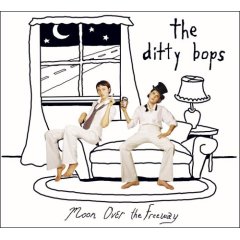
OK, here's another one from the same conversation. I'm replying to the following post from my friend Brock, which in turn was responding to part of my previous post:
"That's the whole question here I think: Is evolutionary change God's mechanism for creation. If so, wow. But how does that relate to Genesis? Does that mean we equate about a billion years to each day of creation? Or, do we hold what the Bible says as the complete Truth of God's Word? I wrestle with this all of the time, in many areas of Scripture."
There was some intervening discussion (very good stuff; too bad you're not a Looney - unless of course you are) ;-) from both Brock and my friend Peri in which they mused on the necessary inexactness of divine communication and Biblical interpretation. Then I contributed the following:
----------
I don't know that I have a lot to add to the good thinking Brock and Peri have done on this issue. Brock, this sort of question is something I think all Christians (probably people of any faith) struggle with, except maybe for those way on either extreme. ("Every single word of the Bible is absolutely literally true in the most literal, simplistic, easy-for-me-to-understand interpretation possible, and that's all there is to it." -or- "Well, it's all a bunch of myths made up by dudes who didn't know the world was round, so there's no reason for me to bother trying to take seriously anything in the Bible that seems difficult.") Those are caricatures, of course, but either one is, in my opinion, a major cop-out for a thinking Christian. I struggle with this stuff all the time too. I think one key is to have the courage to doubt our own infallibility. We aren't God, and deep down, I think we all know that there are some things that we don't know, won't know, *can't* know in this life. And you know what? We'll probably get by just fine not knowing them.
So we might as well admit that some things (the origins of the universe and mankind, for example) are bound to remain somewhat mysterious. But we should let the scientists do their bit to shed light on them, and oppose them at our peril - at one time, the Church was completely convinced that a plain reading of Scripture indicated that the sun orbits the earth. We treated Galileo and a bunch of other guys really poorly over that colossal mistake. Oops. Definitely not the Church's finest hour. Let's not do it again.
But that doesn't mean that we have to concede the sphere of all "real" knowledge to the scientists, and say that everything worth knowing can only be known through the scientific method. Christians also need to let Scripture (including, for example, the first two chapters of Genesis) speak its truths to us, and we need to live and practice them. Among those truths:
- The universe and everything in it - including us - was created (is still being created) by a loving God, who saw that it was good.
- In resting on the seventh day, that God made holy something that our culture tends to regard as highly suspect: leisure. What a gift, if we only accepted it!
- God created us, male and female, in God's image; this is our most fundamental identity; as beings who are meant to image our loving God.
- Despite our being made in the image of God, we have become flawed. We have rebelled, we continue to rebel, and we separate ourselves from God through what is called "sin".
- Despite our sin, God still loves us and is committed to our welfare and to inviting and welcoming us home.
- Women, ever since Eve, are the root of all evil.
Put down the guns, Tam, Dani, everybody - I was *just kidding* on that last one!!!!!!
But anyway, those are some more thoughts on origins.

 Diane Rehm interviewed the Episcopal Church's newly elected Presiding Bishop-Elect, Katharine Jefferts Schori, this morning on her show on WAMU/NPR. I'm listening to it right now, and you can too. I like her. She has strongly-held views (many of which are quite liberal ones, it seems) but she seems very thoughtful and careful and committed both to mission (!) and to reconciliation. I don't know to what extent she'll be able to accomplish that reconciliation within the Episcopal Church and the larger Anglican Communion, but she and the Church she will lead are certainly in my prayers.
Diane Rehm interviewed the Episcopal Church's newly elected Presiding Bishop-Elect, Katharine Jefferts Schori, this morning on her show on WAMU/NPR. I'm listening to it right now, and you can too. I like her. She has strongly-held views (many of which are quite liberal ones, it seems) but she seems very thoughtful and careful and committed both to mission (!) and to reconciliation. I don't know to what extent she'll be able to accomplish that reconciliation within the Episcopal Church and the larger Anglican Communion, but she and the Church she will lead are certainly in my prayers.




